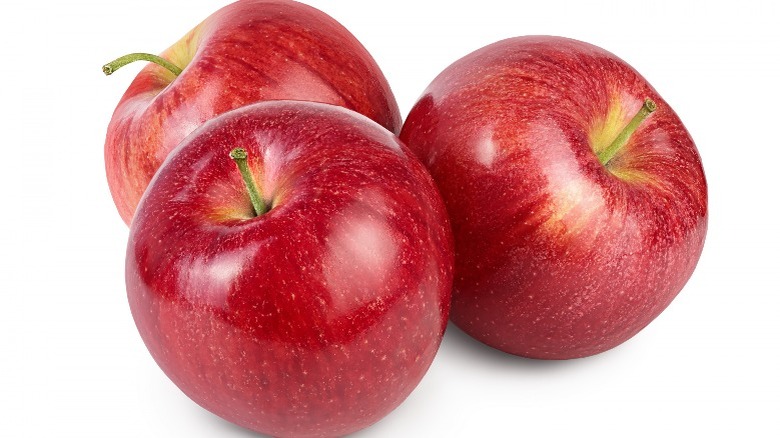How Much Sugar Is In An Apple?
Avoiding sugar as part of a healthy diet isn't always easy. Even without adding sugar, many foods already contain plenty. However, consuming some sugar is still an important part of a balanced diet. Thankfully, you can always turn to fruit as a source of healthy, natural sugars.
So, why are the sugars in fruits far better than the unhealthy refined sugar in the prepared foods you buy or bake into your favorite sweet treats?
"Natural sugar is naturally occurring in food. Think of the sugar that's in fruit or dairy or carbohydrates," wellness dietitian Lindsey Wohlford tells MD Anderson Center. "Refined sugar may be from a natural source, but it has been processed so only sugar remains, like granulated sugar from sugar cane, or corn syrup from corn," she says.
According to the World Health Organization (WHO), added sugars or "free sugars" should make up less than 10% of your diet. However, you do not need to limit foods with naturally occurring sugars, such as fruits and vegetables. The latest edition of The Dietary Guidelines for Americans supports this advice, pointing out that consuming too much added sugar will add plenty of calories but zero nutrients. For this and other health reasons, the guidelines recommend that you choose fruit over cakes, cookies, and other sweets that contain processed sugars whenever possible.
And choosing an apple is a great place to start.
How many apples should you eat in a day?
According to the experts at Harvard T.H. Chan School of Public Health, a medium-sized apple contains roughly 19 grams of sugar, and apples should be eaten whole to receive the full benefits. This is because a lot of the nutrition is in the skin, such as fiber, which aids digestion, and flavonoids, which are antioxidants that may help prevent cell damage in the pancreas.
In fact, according to the experts at Healthline, if you have type 2 diabetes, eating whole apples every day could help reduce insulin resistance, because chemicals in the apple skin signal the pancreas to release more insulin. Red Delicious and Honey Crisp varieties reportedly have the most antioxidants to help improve blood sugar levels and prevent other health issues.
While apples have a lot going for them, there are some caveats to keep in mind. For instance, Eat This, Not That reports that eating too many apples in one day could cause digestion problems if you are already getting significant amounts of fiber in your diet. Also, apples are packed with carbohydrates, so if you eat more than two a day, this could prevent you from burning fat, since your body burns the carbs off first, health expert Stephanie Mansour tells Eat This.
So, go ahead and eat apples, but stick to the tried and true "an apple a day," and you'll be in great shape.


